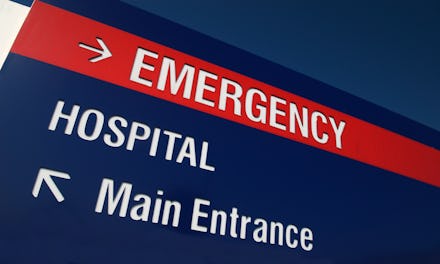This ridiculous new ER insurance policy is everything that's wrong with America's healthcare

No one should have to go without potentially lifesaving emergency care out of fear that they might not be able to afford it. But physicians say that health insurance behemoth UnitedHealthcare will create exactly this scenario through a new policy that would allow it to retroactively deny emergency department claims, MedCity News reported. Expecting people with zero medical training to somehow diagnose themselves is messed-up, period — but especially now, when worrisome symptoms like a fever or nausea could very well indicate COVID-19.
Starting July 1, UnitedHealthcare can deny or limit coverage for an emergency department (ED) visit if the insurance company determines it wasn’t, in fact, an emergency, according to MedCity News. The outlet explained that UnitedHealthcare will make this call based on the patient’s condition, the type and number of diagnostic services they receive, and other external factors.
The insurer implemented the policy — which would apply to fully insured members in most states — as a means of reducing ED costs, Tracey Lempner, UnitedHealthcare’s director of communications, told MedCity News. “Unnecessary use of the emergency room costs nearly $32 billion annually, driving up healthcare costs for everyone,” she wrote in an email to the outlet. “We are taking steps to make care more affordable, encouraging people who do not have a healthcare emergency to seek treatment in a more appropriate setting, such as an urgent care center.” Per MedCity News, providers can submit an attestation if they consider the visit an emergency, in which case UnitedHealthcare would probably still cover it.
But in a letter to UnitedHealthcare, Richard J. Pollack, president and CEO of the American Hospital Association wrote that “threatening patients with a financial penalty for making the wrong decision could have a chilling effect on seeking emergency care” and highlighted the danger of delaying emergency care during the pandemic.
Pollack’s letter also described UnitedHealthcare’s confusing, contradictory advice to its members: On the one hand, the insurance company’s website urges them to beeline it to the ER or call 911 if they think they’re experiencing on emergency. It then lists symptoms that the payer says would warrant urgent care (rather than emergency room care), like stomach pain, diarrhea, and abnormal vaginal bleeding — but Pollack noted that these same symptoms could also indicate a medical emergency.
The American College of Emergency Physicians (ACEP) shares Pollack’s concern that UnitedHealthcare’s policy could dissuade people from seeking emergency care. “In many instances, even physicians cannot know if a patient’s symptoms require emergency treatment without conducting a comprehensive medical examination,” ACEP wrote in a statement shared on Twitter. "Reckless policies like this will leave millions fearful of seeking medical care just as we're getting hold of the pandemic," the organization tweeted alongside the statement.
Indeed, in response to UnitedHealthcare’s new policy, Dr. Megan Ranney, M.D., M.P.H., a physician at Brown Emergency Medicine, tweeted examples of seemingly innocuous symptoms that turned out to be emergencies upon further evaluation. “I’ve taken care of people with ‘indigestion’ who had heart attacks,” she wrote. “People with ‘pink eye’ who had vision-threatening infections. Ppl with a 'tension headache' who had brain bleed.” It’s scary to imagine what would’ve happened if these patients hadn’t gone to the ER because they weren't sure if their symptoms amounted to an emergency — at least in the eyes of an insurance company.
ACEP also tweeted that they believe UnitedHealthcare’s policy is unlawful because it violates the Prudent Layperson Standard, which requires insurance companies to cover emergency care based on a patient’s symptoms, not their diagnosis. Lempner, however, told MedCity News that if a patient ends up getting treatment for a non-emergent issue (like pink eye) during an ED visit, the company will cover it based on the patient's benefit plan.
As MedCity News notes, this differs from Anthem’s similar, highly-criticized policy, which took effect in 2017. Under that policy, if an ED diagnosis falls under a list of non-emergent conditions, Anthem will evaluate the visit and may choose not to cover it. ACEP and the Medical Association of Georgia sued Anthem’s Blue Cross Shield of Georgia over the policy in 2018 and are currently in the midst of that battle.
The somewhat bright side, according to MedCity News: When challenged, Anthem overturned most of the 12,000 ED claims it denied — perhaps suggesting that UnitedHealthcare’s policy might not be as rigid, either. But none of this changes the fact that it forces patients into the cruel position of making a risky decision about their health — and during a pandemic, no less.